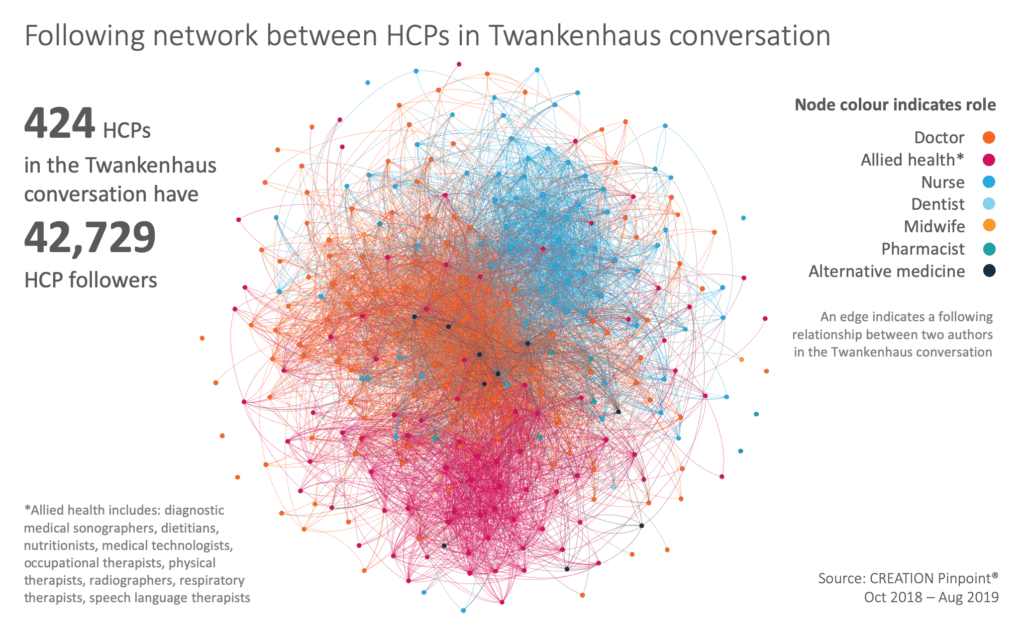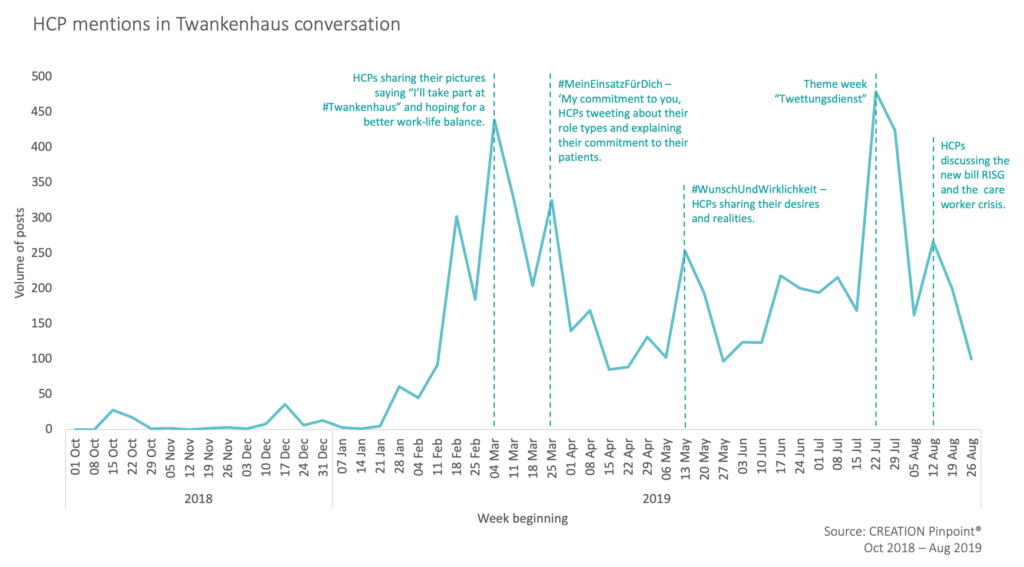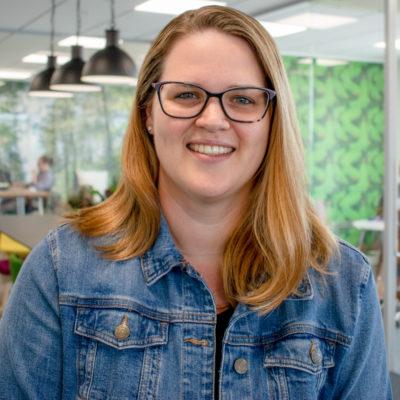Germany is facing an elderly care crisis: As the number of older people in need of care is increasing, there are more individuals who would like to receive care at home. There is also a shortage of doctors, nurses and in general, German HCPs. One of the big problems that German HCPs are facing now is time. Time to care, spend with patients and to look after them properly. Also time for their own family!
Man kann es nicht oft genug sagen: mit dem #twankenhaus-Treffen haben wir den Grundstein für eine Veränderung gelegt. Wir wünschen uns familienfreundliche Arbeitsmodelle und fachlichen Austausch für unsere Patienten. Bieten im Gegenzug geballte Arbeitskraft und Liebe für den Job!
— Schwesterfraudoktor (@SchwesterFD) February 17, 2019
As we listen to the unprompted healthcare professional (HCP) conversations online we have always noted a difference when we analyse the HCP conversation Germany. If we take Twitter, for example, HCPs in Germany are cautious about the content they post, many are anonymised and we have seen that in Germany, HCPs are generally less active online compared to their peers in Spain or the UK. Nevertheless, the content they post gives a great insight into what German HCPs are thinking.
#Twankenhaus was born
In February 2019, a group of German HCPs representing all kinds of different role types (including nurses, doctors, paramedics, physiotherapists, etc.) met and decided to do something. They call themselves ‘Twankenhaus’ (‘Tw’ – stands for Twitter and ‘ankenhaus’ for the German word for hospital “Krankenhaus”) and on their homepage, they describe it as a ‘next generation thinktank’ in the health sector. Twankenhaus’ aim, as stated on their website, is to draw attention to the current maladministration in the health sector. They love their jobs but they need appropriate and decent working conditions and time for all their patients… #twankenhaus was born!
CREATION Pinpoint® has analysed the use of the hashtag ‘#twankenhaus’ on Twitter from the 1st of October 2018 until the end of August 2019 and identified 424 HCPs who are active in the Twankenhaus conversation. The top two role types most active in the discussion are doctors and nurses followed by allied health professionals which include diagnostic medical sonographers, dietitians, medical technologists, occupational therapists, physical therapists and radiographers.

Those 424 HCPs have over 42,000 HCP followers worldwide!
Twankenhaus has three key topics which are followed throughout the whole conversation on Twitter: health education in the population, emergency medical services and work-life balance. As well as these key topics, Twankenhaus launches different themed weeks. So far they have launched 4 themed weeks throughout this year with the most recent one in August called #twettungsdienst (emergency medical services).
When we look at the overall Twankenhaus conversation in the past year, we can see the conversation has picked up since February 2019 with many spikes in the conversation since.

The first significant spike in March 2019 was all about a healthy work-life balance. The most-used term that German HCPs were using over that time was ‘Familie’, with lots of pictures being shared of HCPs holding a piece of paper saying ‘Ich mach mit beim #Twankenhaus’ [I am joining #Twankenhaus]. They were stating that they wanted to have time for their families whilst also enjoying their work as an HCP.
https://twitter.com/jan_padberg/status/1104028230158372877
#Vereinbarkeit – German HCPs are on a mission to make a healthy work life balance possible
The first themed week was called #Vereinbarkeit (compatibility; used to describe the balance between family and career) and was where we saw the most HCP engagement. #Vereinbarkeit is about finding the right work-life balance especially being a professional in the health care sector.
One tweet from a German female HCP received lots of attention as she shared that her husband (also an HCP) was put under pressure by his manager to not take one month of parental leave after the birth of his child. HCPs were upset that something like this is happening in 2019, and they shared all kinds of recommendations and support.
Mein Mann hatte ein Gespräch mit dem Ltd. OA seiner Rotationsklinik in dem er massiv unter Druck gesetzt wurde um auf das Nehmen von einem (!) Monat Elternzeit nach der Geburt zu verzichten. Im Jahr 2019. In einer Großstadt. #vereinbarkeit #twankenhaus #medlife
— Dr. Influenza (@DrInfluenza) March 15, 2019
#MeinEinsatzfürDich – “We do so much more for you”
The second themed week was called #MeinEinsatzfürDich (my commitment to you). HCPs used this hashtag to express everything they do for their patients. This is something very notable throughout the whole Twankenhaus conversation: German HCPs care deeply for their patients! They shared frustration at not having enough time to spend with each patient. This is something where HCPs behind the Twankenhaus movement would like to see a change. As they state on their homepage: “What we want, In short, we want more time. Time for the patients….”
This theme week was used to educate patients – to really explain what, for example, an internist does or what it means to really be an HCP. Many HCPs shared what they do besides ‘only’ looking after patients, which might be further training, personal development, health educator and visiting and speaking at congress meetings.
#MeinEinsatzFürDich Ich bin HNO-Arzt in der Praxis. Ich mache Dein Ohr sauber und stille Dein Nasenbluten. Ich erkläre Dir, wie Du mit Cochlea Implantaten wieder hörst und zeige Dir Übungen gegen Lagerungsschwindel. In meiner Freizeit kläre ich über Homöopathie auf. #Twankenhaus pic.twitter.com/1WNjcJLhrh
— Dr. Christian Lübbers (@drluebbers) March 29, 2019
HCPs in the #Twankenhaus conversation
Let’s have a look at those HCPs who are standing out in the #Twankenhaus conversation. @mbmnursingstaff, a Nurse from Saarland, stands out because he mentioned Twankenhaus the most. Also @SchwesterFD, a GP in Germany and @Joernroeschen, a Nurse, are the two HCPs most mentioned by their peers.
It’s worth noting that there are two non-HCPs in the Twankenhaus conversation who have been mentioned together more than 340 times by HCPs. One of them is Jens Spahn, the current German Minister of Health, and Bettina Frank, a migraine patient advocate who is also part of the Twankenhaus team.
| Twitter Handle | Medical speciality | Location | Twanken- haus mentions | Mentioned by other HCPs | Reposted by other HCPs | All followers | HCP followers | Lifetime tweets |
|---|---|---|---|---|---|---|---|---|
| @mbmnursingstaff | Nurse | Saarland | 342 | 14 | 39 | 298 | 47 | 11,186 |
| @KMGThiede target | General Practitioner | Berlin | 238 | 53 | 16 | 753 | 149 | 2,044 |
| @Arthrosezentrum | Orthopaedist | Düsseldorf | 89 | 105 | 70 | 1,868 | 196 | 9,990 |
| @SchwesterFD | General Practitioner | Germany | 181 | 134 | 76 | 8,959 | 353 | 12,564 |
| @Joernroeschen | Nurse | Germany | 230 | 134 | 9 | 1,261 | 149 | 20,276 |
Care without prejudice
In July, Michael a nurse from Bayern, posted that he would like to see a hospital without racism, especially in the medical and nursing ranks. HCPs retweeted and commented on their experience with racism and agreed that care should be without prejudice.
Ich wünsche mir ein Krankenhaus ohne Rassismus.
Mich regen diese rassistischen Äußerungen in ärztlichen und pflegerischen Reihen dermaßen auf. Diese Ideologie hat nichts im Sozial- und Gesundheitswesen zu suchen.
…wir haben mehrere Ausgänge. Tschüss.#twankenhaus— St. Michael twundesminister 📯 (@twundesminister) July 31, 2019
#Twettungsdienst – “Only in emergency call 112”
The fourth themed week was launched at the end of August, called #Twettungsdienst (‘Tw’ from Twitter, ‘ettungsdienst’ from Rettungsdienst (emergency medical services). KBV, National Association of Statutory Health Insurance Physicians, launched a phone number (116 117) over 5 years ago which is for non-emergency services. Many patients are not aware of this number and would call the emergency number in Germany (112) directly. Twankenhaus, together with German HCPs, is raising awareness to only use 112 in case of a real emergency.
What can we learn from these conversations?
Twankenhaus has brought the German Twitter HCP community closer and is facilitating a lot of great discussion. We have seen they are not afraid to pick up topics like racism and mental health. Sharing stories of their everyday life as an HCP, both success and struggles, shows their heart and compassion and presents the opportunity for meaningful change.
To discover more stories of HCPs using social media, and to understand what that means for you as a healthcare provider, an NGO or healthcare manufacturer, sign up to our monthly eJournal, CREATION Knowledge.
 By Anni Neumann
By Anni Neumann 


